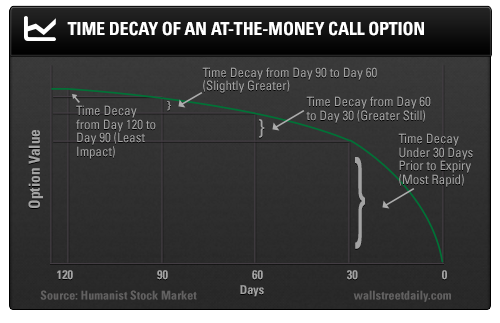If you’ve ever traded options, you’re likely aware of the “Greeks.”
Delta, which compares the change in price of an underlying asset with the corresponding change in the price of a derivative, and vega, which measures an option’s sensitivity to changes in the volatility of the underlying asset, are the most popular.
But theta is another valuable tool that can help you sharpen your options trading. Indeed, it’s far more than just the eighth letter of the Greek alphabet.
The Data Behind Theta
Theta is one of the most significant concepts for options traders.
The “T” represents time – that is, the measurement of the time decay of an option. More specifically, it represents the dollar amount that the option will lose each day as time passes. Thus, it’s an important gauge for both options buyers and sellers.
Think of theta as a risk measurement tool that quantifies the risk that time imposes on options.
As an example, if the strike price of an option is $1,275 and the theta is 60.11, then the value of the option, or its premium, will fall by $60.11 per day.
For options traders seeking income, theta is less significant than it is for directional traders. That’s because if you have positive theta, you have negative gamma (the rate of change of delta).
Yes, options traders need to make sacrifices.
Realize also that theta isn’t linear. For an at-the-money (ATM) option, theta increases in value as it approaches option expiration (as does gamma). This is the reverse of in-the-money (ITM) and out-of-the-money (OTM) options, which both decrease toward expiration.
This can be best visualized on a curve, as seen below.

Here you can see that the time value of the option is stable initially and decreases only slightly. But the rate of this decline grows until the final month, when the decline is most pronounced.
The Two-Faced Greek
By now you’re probably wondering if theta can help you or hurt you. Well, it can do both.
You see, theta is an options trader’s foe when that trader is long options – but it’s a good friend to the seller.
Let’s assume you’re looking to buy an option, realizing its value will decay as time passes.
In this case, it would be advantageous to purchase a longer-term option, so that it takes longer for the time value to decay. Conversely, to profit from time decay, you’d want to sell shorter-term options, as the loss in value will occur at a more rapid pace.
Here’s a simple example.
The value of an ATM option consists solely of time value and it moves at the square root of time. Sounds complex, but there’s no need to take out your calculator just yet.
This formula means simply that if an ATM option expiring in one month is valued at $1, then the price for a two-month option with the same strike price would be $1 multiplied by the square root of two (or $1.41). Should it expire in three months it would trade for $1 multiplied by the square root of three ($1.73).
Since the time decay of ATM options accelerates as expiration nears, it makes sense that theta is a larger number for near-term options than for longer-term options.
On the Portfolio Level
With an understanding of the power of theta as it applies to individual options, we can then apply this knowledge to our entire portfolio.
If you tend to be net-long options (known as being “long volatility”), you’ll have a negative theta and vice-versa with a net-short options portfolio (or “short volatility”). All else equal, a long options portfolio will lose value due to time decay, whereas you’ll make money every day due to time decay if you’re net short options – a nice windfall.
Furthermore, an option with high volatility should lose more time value than an option with low volatility.
In other words, as volatility rises, theta will become a larger negative number for options of all expiration dates, both near and longer term. As volatility falls, theta becomes a smaller negative number.
If you embrace volatility, be mindful of the fact that the time decay factor intensifies with volatile contracts potentially eroding the benefits you’re getting from trading volatility.
And if you decide to sell high-volatility options, remember that the value of the option decreases as the premium erodes at an accelerated rate, and this effect is most pronounced with ATM options.
Bottom line: Time has importance for option traders on a conceptual level more so than a practical one, so theta isn’t used by all traders when assessing the value of options.
Professional traders, nevertheless, know that the power of theta can help them avoid time bombs while keeping time on their side.
Good investing,
by Shelley Goldberg
